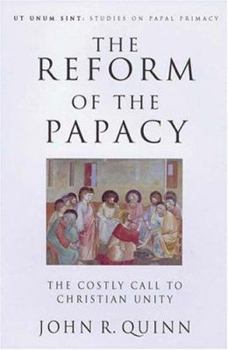The Reform of the Papacy (Ut Unum Sint)
Catholic Press Award-winner. With the ascendancy of a new pope and his papal visit to the U.S. in 2009, the future of the Catholic church is again on the minds of many. In this influential bestseller,... This description may be from another edition of this product.
Format:Paperback
Language:English
ISBN:0824518268
ISBN13:9780824518264
Release Date:January 1999
Publisher:Herder & Herder
Length:160 Pages
Weight:1.40 lbs.
Dimensions:0.9" x 5.7" x 8.5"
Customer Reviews
5 ratings
A Careful, Considerate, Courageous and Much Needed Critique
Published by Thriftbooks.com User , 24 years ago
Acknowledging that the way the papacy currently functions is an obstacle to Christian unity, John Paul II in 1995 invited suggestions for change, and John Quinn took him at his word. Quinn, former Archbishop of San Francisco, is a man who knows whereof he speaks and a man deeply concerned for the welfare of the Catholic Church. He points out in nuanced and respectful terms that the centralizing of power in the Church, the lack of subsidiarity in the appointment of bishops and in many other things, and the aggrandizement (and ordination) of the Roman Curia and college of cardinals - all changeable aspects of the way the papacy functions -- have undermined the exercise of real collegiality in church synods and national conferences, and deprived the local churches and bishops of rightful authority and power. Other Christian groups have no incentive to unite to such a church. Drawing on history and the ideas of Vatican II, Quinn makes suggestions pointing the way to a much needed reform, and not just for the sake of ecumenism. This is recommended reading for thoughtful Christians of all persuasions.
Just right for starting a discussion...
Published by Thriftbooks.com User , 24 years ago
A group of ten women from our parish met recently to discuss this book. We were surprised that it hasn't attracted banner headlines. We found it to be a prophetic book, and disturbing, in the way good prayer is disturbing. It described not only the problem we have with the hierarchical structure of the church at the top but at the bottom, too. The problems that exist between bishops and the pope, exist between priests and their bishop, and most especially, between lay folk and their pastor. We took his advice to heart - " How does the Pope propose to pursue the search for unity? At the outset, he mentions four things: the centrality of the cross, reflection, prayer and conversion. There must be honest reflection on past differences, the purification of memories, mutual forgiveness, and honest, clear and calm vision of the present divisions."(p.17)This book was a wonderful place to begin a small group discussion in a parish.Some of us thought that Archbishop Quinn might have mentioned the primacy of conscience, and so strengthened his argument, but, as he says, " I have rarely given a talk...without someone pointing out that I failed to speak about something of great concern to them." We closed our discussion with the promise to pass this book on, to keep this reflection going, out of love for our church.
Taking the Holy Father at his word
Published by Thriftbooks.com User , 24 years ago
This book, like Archbishop Quinn's lecture at Oxford the previous year is an attempt to answer a call for advice given by Pope John Paul II in his encyclical "Ut Unum Sint." The charge that Quinn is somehow disaffected and rebellious simply does not wash. This book is a detailed historical study of various aspects of papal governance. Acting on the principle "Ecclesia semper reformanda" Quinn advocates changes in areas of church administration where change is truly required and NO doctrinal barriers exist for effecting such change. The outcome of such change, in my view, would be a purer and more effecacious proclamation of the Gospel, not a diminishment of the Catholic Church.
The Church As It Should Be
Published by Thriftbooks.com User , 24 years ago
Archbishop Quinn's book is a most beatiful and respectful work. It is very easy to read and understand. Ultimately, if his suggestions were to be given the serious consideration they deserve we would be guaranteed a better and everlasting Church.
A Modest, Reasoned Call for Reform
Published by Thriftbooks.com User , 25 years ago
In response to the papal encyclical "Ut Unum Sint" (May 25, 1995) John R. Quinn examines the necessity of reform in the papacy as a prerequisite for serious consideration of union between the Roman Catholic church and other Christian churches. The retired Archbishop of San Francisco stresses the need for decentralization, greater collegiality, and reform of the way bishops are appointed. He also recommends changes in the college of cardinals, whcih have become an elite group within the college of bishops, and in the way the Pope is chosen. Finally, he calls for reform of the Roman Curia. Written in a clear informative manner, the book displays acquaintance with current scholarship and avoids polemics. It might be a bit esoteric for many readers. Quinn could have given greater attention to the system of Roman colleges for the training of clergy, a vestige of the imperial Roman practice of taking the children of royalty in subject countries, educating them in Rome, and , once imbued with the Roman mentality, sending them back to rule in their own countries. Quinn, a gratuate of the North American College (class of 1954) is a product of this system but does not seem to realize the implications of "Romanita'"- both for reform of the papacy and for church union. Well worth reading and, hopefully, a contribution to ecumenism.






